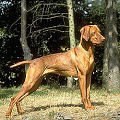DOGS AND BLOAT
Understanding the causes and symptoms of GDV in dogs.
BE A RESPONSIBLE PET OWNER
HAVE YOUR PET SPAYED OR NEUTERED
Consider bloat to be a true emergency.
Gastric dilatation and volvulus (GDV) is a top killer of dogs. Deep-chested giant and large breed dogs are most at risk.
Bloat in dogs is the build up of excess gas, fluid or foam. Bloat (or dilatation) occurs when the valve at the bottom of the stomach is blocked which prevents gas and other material produced by the digestive process from exiting the stomach.
Bloat can happen very rapidly and can be fatal when it is a severe case. Bloat can occur on it's own or as a precursor to torsion.
GDV can occur when the stomach becomes enlarged and then twists somewhere between a quarter and a full turn. The twisting is called volvulus. The openings at the top and bottom of the stomach twist, blocking all materials from entering or leaving the stomach. As the digestive process continues, the dog's stomach swells more and more eventually causing circulation and breathing problems.
Bloat/GDV must be treated by a veterinarian immediately. There are no proven "home remedies" for bloat and often torsion is involved which requires surgery.
SYMPTOMS OF BLOAT
Unproductive vomiting
Apparent distress
Swollen/distended abdomen particularly when it happens quickly.
Restlessness
Excessive salivation/drooling
Panting
Dog's stomach feels hard, like a drum.
Pacing
Repeated turning to look at flank/abdomen.
Kicking/scratching at belly
WHAT CAUSES BLOAT
Studies of what exactly causes bloat remain inconclusive. Purdue University has done numerous studies and while the results are not etched in stone, the findings give us a heads-up on factors which can lead to bloat.
Age - Likelihood of bloat seems to increase with age.
Genetic - Having a close relative that has experienced GDV
Personality - Fearful dogs are much more likely to have GDV than a dog with a happy personality.
Eating Habits - The risk of GDV is highest for dogs fed a larger volume of food once daily.
Raised bowls increase the risk. (Volume 217, No. 10 of Journal of the American Veterinary Medical Association.)
Large Breed and Giant Breed dogs are more susceptible to bloat
Dogs who have experienced bloat once are very apt to have a repeat occurence
Breeds At Greatest Risk
Airedale Terrier Akita Basset Hound
Bloodhound
Borzoi
Boxer
Collie
Gordon Setter
Great Dane
Irish Setter
Irish Wolfhound
Newfoundland
O.E. Sheepdog
Rottweiler
Saint Bernard
Standard Poodle
Weimaraner
Bloat in Dogs

: MORE ABOUT DOGS :
quality products for your pets.
Name the breed
Place cursor on picture for answer
Web Site Design by S&J Enterprises - Homestead Website Design


